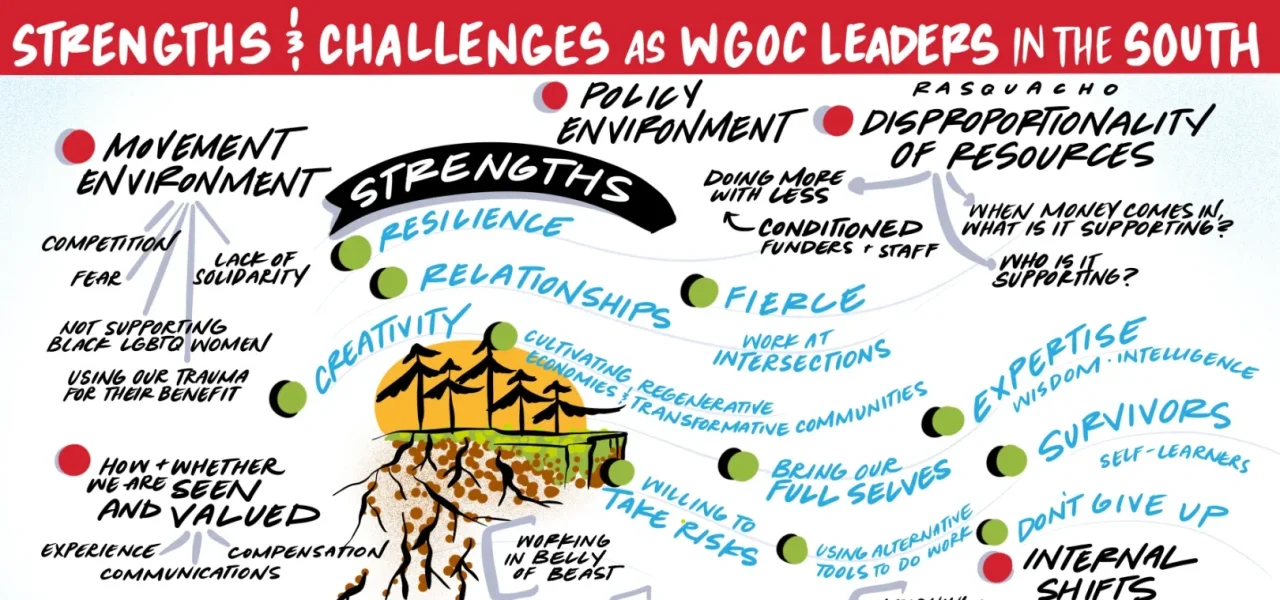September 1, 2022
Ms. South Convening: The Need for Better Investment In Southern WGOC
by Program Officers Coya White Hat-Artichoker and Samantha Franklin
We recently hosted a convening that brought together our inaugural Ms. South grantee partners to connect, build community, strengthen their organizations, and create support networks. This convening also provided us at the Ms. Foundation an opportunity to learn from their leadership experiences to be a better funding partner and ally to these groups. Ms. South is our grantmaking, capacity building, and networking strategy that supports the leadership of Women and Girls of Color (WGOC) and strengthens their ecosystem of leaders. We aim to do so via targeted invested funding in the South in 14 key states: Arkansas, Florida, Georgia, Kentucky, Louisiana, Mississippi, North Carolina, Oklahoma, South Carolina, Tennessee, Texas, Virginia, and West Virginia. This strategy is informed by our Pocket Change report and strategic plan. To develop the convening, we looked to grantee partners for direction. We learned that they were interested in getting to know one another better, building connections, finding thought partners, and learning about ways they can amplify each others’ work. These priorities resonated with our understanding of the way that organizations led by and for WGOC have historically relied on one another for information, reach, and other resources. Strengthening the ecosystem of WGOC-led organizations by increasing connectivity between them is a critical component of our power-building strategy in the South. The convening agenda, which was thoughtfully designed by the facilitation team at Guerrera Strategies, fostered a rich discussion of the strengths WGOC leaders in the South bring to the work, as well as the challenges they face. Grantee partners shared the considerations they are managing on a daily basis, articulating: Also on the agenda were opening remarks from President & CEO Teresa C. Younger and keynote speaker Loretta Ross. Their presence at the convening was significant because hearing from these powerful and relatable leaders who reflected the folks in the room helped to open up the floor and set the stage for people to engage in an authentic conversation about their leadership experiences. “I have been where you are, I have done similar work. I want you to always feel like you can call me,” said Teresa. Teresa related to the grantees on leadership and how difficult it can be. Representation matters and her introduction really helped to illustrate that. Many grantees were so grateful for her voice. “I think you learn more from leaders when they tell you about their scars as much as their success. Alice Walker calls them our warrior marks” said Loretta. Loretta did a wonderful job talking about her leadership successes and failures, and talking about how we care for each other. She encouraged call-in culture and emphasized that no one of us can be disposable to any of us. The perspectives of our grantee partners expanded our understanding and underscored what we knew to be true – that there is great need for additional resources to support WGOC leaders’ wellness, connection, and growth as well as the reach and impact of their organizations. We know that WGOC leaders and organizers have led nearly every impactful grassroots movement in United States history, and we know that Southern WGOC leaders carry a particular history of resistance in the South, which has been a testing ground for regressive legislation that has influenced the policy environments in other states. Conversation also highlighted the capacity building needs of our grantee partners. One key area was in communicating their work to multiple audiences. Grantees named media training, access to tools to communicate their work in ways foundations can understand, and assistance from current funders who understand their work in promoting their analysis and amplifying their stories. They also called upon Ms. Foundation to create spaces where other foundations could learn about their work. Another key area was in supporting their connection and collaboration. Suggestions made in this area included paying organizations for the investment of time that collaboration requires and creating more spaces for connection, communication, and dialogue between leaders at multiple levels of their organizations. If the fall of Roe has taught us anything, it is that we are in a moment of urgency around building true power – moving significant, flexible, and long-term resources to leadership to create multifaceted strategies for inclusive political and social transformation. Philanthropy needs to acknowledge the strategic significance of the South and examine the biases that inform the ways it may choose not to invest in Southern leadership. If we are to continue to build an equitable and just society, the grantmaking community needs to trust and pour resources into the leadership of WGOC – particularly in the South. And, we as funders and partners also need to see who these leaders are and understand where they’re coming from. Image by graphic recorder Rio Holaday

